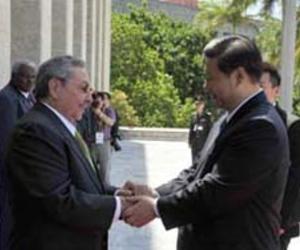China, Cuba, oil and the 90 miles
- Submitted by: manso
- Politics and Government
- 06 / 12 / 2011

Saturday, 11 June 2011 08:11.A Correspondent's Notebook. By Manuel Alberto Ramy.Chinese Vice President Xi Jimping, probable successor to President Hu Jintao,left Cuba a mere 72 hours ago. During his stay the two countries signed 13 agreements, mainly in the oil and communications' sectors. The value of these agreements, as well as other financing accords, have been cited by the media.
There are few numbers, but plenty to think about. Moderation is eloquent.
I searched Chinese media and found the same thing: a general view. Thanks to a generous colleague I accessed the China National Petroleum Company's web site (CNPC), the most important Chinese oil corporation. Its chairman, Jiang Jiemin, was the person who signed the agreement with CUPET, its Cuban counterpart. What does CNPC say?
In a nutshell, both signed a cooperative framework agreement between the two state-owned oil companies. According to the document, "CNPC will make full use of its advantages in oil and gas exploration and development, oilfield services, engineering construction and materials; & equipment to help Cuba reduce operation costs and raise crude oil output and recovery rates in some existing oilfields" The report adds that "CNPC will expand cooperation with CUPET in exploring and developing new onshore and offshore oil blocks in Cuba."
It is obvious that China continues to expand its presence on the island, its second trading partner after Venezuela, and that it now could be tempted to place its bet at sea investing in some of the 56 blocks that Cuba has on its Exclusive Economic Zone in the Gulf of Mexico.
In a conversation with the above-mentioned colleague, he stated that the probable Chinese decision to venture into the exploration of some of these blocks came from "non-confirmed but serious sources." The information is probably accurate. But for the time being, I prefer playing it safe and simply underline that the agreement signed by CNPC, related to much of these oil processes, is based on a very important political decision on the part of the government of the People's Republic of China. And that it is done 90 miles away from the U.S.
PROGRESO WEEKLY/
Source: http://groups.yahoo.com/group/CubaNews/message/124171
Comments